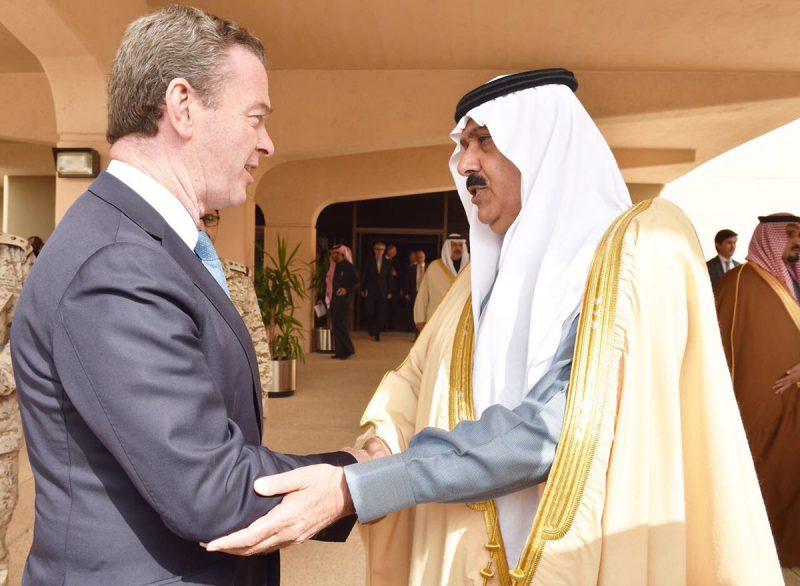
Defence Minister Christopher Pyne has released the report of the independent review of the Defence Trade Controls Act 2012. The report comes at a time when the government is under increasing pressure for authorising the transfer of defence goods to Saudi Arabia and the United Arab Emirates, both of which continue to fight a legally contentious war in Yemen.
As Australia’s geostrategic environment becomes increasingly unstable and threats to our air and sea lanes increase, we need to become more self-reliant. That may mean increasing our defence exports to ensure Australia has the research and development and manufacturing capacity needed into the future. But any such expansion must still be in accord with the international legal framework that Australia helped to develop.
Australia was a key negotiator and advocate of the United Nations Arms Trade Treaty, which came into force in 2014. It was decided no new legislation was needed to implement the treaty in Australia because the existing policy framework met all the treaty’s needs. Transparency and human rights are at the core of the treaty. It requires transfer applications to be assessed for the likelihood that weapons will be used to undermine international peace and security or facilitate serious breaches of international humanitarian law or human rights, including serious acts of violence against women and children.
The war in Yemen has been led by Saudi Arabia, with significant input from regional allies such as the United Arab Emirates. The war is a serious international peace and security concern, in part due to breaches of international humanitarian law and human rights law. Saudi-led blockades have prevented the transfer of food and medicine needed by the majority of the Yemeni population. Last year, the world was aghast at footage of a school bus hit by Saudi bombs. In February, UNICEF’s Middle East and North Africa chief, Geert Cappelaere, explained: ‘In Yemen today, nearly 1.2 million children continue to live in 31 active conflict zones … in areas witnessing heavy, war-related violence.’ He went on to say the ‘impact of the conflict in Yemen runs deep and has not spared a single child’.
The United States, the United Kingdom and Germany are strengthening their resolve to end military support for Saudi Arabia. The US House of Representatives has voted to end military assistance to Saudi Arabia. The House of Lords has said the UK government is breaking international humanitarian law by issuing export licences and selling munitions to Saudi Arabia that ‘are highly likely to be the cause of significant civilian casualties in Yemen’. Germany halted defence exports in November, even though its arms industry is in the midst of a downturn. Italy, Finland and Denmark have all halted exports to Saudi Arabia.
The review into the Defence Trade Controls Act 2012 was undertaken by Vivienne Thom and completed in October 2018. The purpose was to assess ‘whether the Act is fit for purpose, particularly whether it adequately safeguards national defence capability’. It wasn’t until February that Pyne tabled the report, making it publicly available. The report considers the administration of the act, whether there are any gaps in its controls, and whether there is any regulatory overreach. But it entirely fails to consider the role of the Arms Trade Treaty in the international arrangements for defence trade controls.
There’s widespread concern about a lack of multiagency cooperation for defence trade controls. Defence is responsible for granting export permits and maintaining the data on authorised exports. Foreign Affairs is supposed to provide advice regarding human rights and arms embargoes and prepare annual reports for the Arms Trade Treaty. Home Affairs is supposed to track actual exports and maintain data on them.
Although Defence officials have repeatedly told Senate estimates that human rights obligations are a consideration in decisions to authorise exports, Australia has been providing defence goods to Saudi Arabia that are likely to be used in the war in Yemen. This is surely evidence of flaws in the multiagency system for defence exports.
There’s a significant need for a vastly improved multiagency platform to manage applications and to process and report on defence exports. Reporting on Australia’s international obligations wouldn’t be a burden if we had a suitably designed platform that could provide a single window for industry, and a skeleton that met the information needs of all three departments and their relevant reporting obligations.
A parliamentary inquiry is required to investigate if Australia’s defence export regime meets our obligations under the Arms Trade Treaty. South Australian Labor Senator Alex Gallacher is just one voice calling for good governance in Australia’s defence exports. It’s possible that any updates to the Defence Trade Controls Act will be sent through the Joint Standing Committee on Treaties. But the Joint Standing Committee on Foreign Affairs, Defence and Trade is the most suitable place for such an inquiry to ensure that Australian defence exports only occur in the context of the rules-based global order, and that a suitable platform is developed to facilitate that.